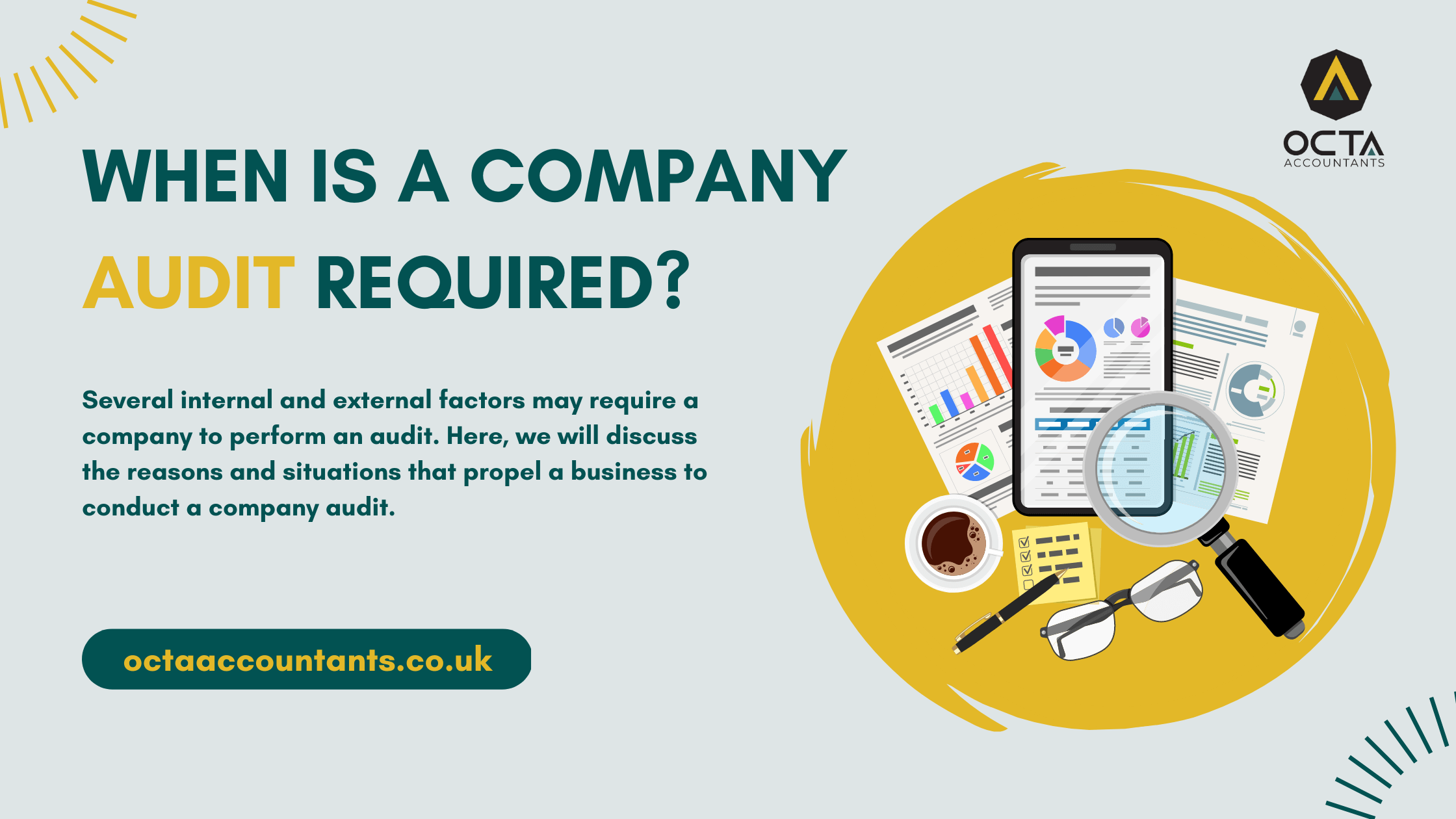When is a company audit required?


Octa Accountants

5 Min Read

Feb 10, 2023

Accounting & Bookkeeping
Owners of small companies should not be concerned about audits, but if their company is expanding and becoming successful, company audits are required. An independent audit verifies the authenticity and dependability of their financial statements, providing trust to investors, lenders, and company executive management. In some circumstances, audits are required by law, and they are essential with an operational aspect in others.

What is a company audit?
An audit of a company is an independent examination of its financial statements and supporting disclosures to assure they are accurate, dependable, and under applicable financial rules and regulations. It also assists in the identification of flaws or potential areas for improvement in a company’s internal controls, financial reporting processes, and financial health.
Moreover, it gives stakeholders trust that the company’s financial information is reliable and can be trusted to make good decisions. Audits can also help avoid fraud and inconsistencies in financial reporting and address the root cause where companies can enhance their financial systems and controls, resulting in more accurate and effective operations.
10 Reasons why a company audit is required
A company audit is usually required under the following circumstances:
1) Legal requirements:
Many companies, such as public companies, large private companies, and non-profit organisations, are obliged to undergo audits in several countries. These audits are performed to verify that the financial statements accurately reflect the company’s financial position and that the company is functioning in conformity with the laws and regulations. An annual audit of a company’s financial statements is legally mandated, often for larger companies or public companies registered on a stock market.
2) Stakeholder requirement:
A few stakeholders, such as bankers, investors, or government entities, may demand a company to undergo an audit for receiving finance, investment, or licensing as a requirement.
3) Shareholder requirements:
Several companies’ shareholders may demand an audit as a requirement of investment. Shareholders may desire to see independent confirmation of the company’s financial report to evaluate the company’s financial performance and make accurate investment decisions. Whenever shareholders suspect inconsistencies or abnormalities in a company’s financial report, they may request an audit.
Also Read: Why is a financial audit important?
4) Loan requirements:
When a company seeks a loan, the lender may need an audit as part of the application procedure. The auditor’s objective is to evaluate the firm’s financial condition and determine whether the company is capable of repaying its loan. As a condition of the loan or finance contract, companies seeking financing or loans from banks or other financial organisations may be obliged to have an audit conducted.
5) Determining potential fraud:
An audit can assist a company in preventing and detecting fraud by analysing internal control systems and recognising any weaknesses or inadequacies in those controls. An independent auditor can also examine transactions and accounts to detect unusual conduct.
6) Building investor confidence:
An audit provides shareholders with an independent analysis of a company’s financial performance and the accuracy of its financial statements. It boosts investor confidence and makes it simple for the company to raise capital.
Also Read: How to register a company in the UK?
7) Internal control assessment:
Companies conduct internal audits to evaluate internal control systems and find ways to improve them. Internal audits assist in determining potential risks and guarantee procedure and policy compliance. Furthermore, they are used to identify financial management flaws, improve financial reporting, or make preparations for a potential acquisition internally.
Hire a UK-based Accounting Firm!
Hire accountants in East London or in any part of the United Kingdom to manage your taxes. A dedicated personal accountant helps you keep HMRC compliant and submits your taxes on time!
8) Statutory audit and regulatory compliance:
By law, companies must have their financial accounts audited yearly by a licensed auditor. Depending on the country or location, this applies to public limited companies (PLCs), large private companies and various other forms of companies. Companies in regulated sectors, including healthcare, banking and insurance are subject to regular audits to verify adherence to industry laws.
9) Industry requirement:
Industries that handle sensitive financial information or operate in heavily regulated environments may require constant audits to maintain compliance with company standards and legislation.
10) Mergers and acquisitions:
Companies operating in mergers or acquisitions require their financials to be audited to reassure the acquiring company or investors. It is essential to remember that company audit criteria differ according to the nation and region, along with the kind and size of the company. Moreover, it’s advisable to consult with a professional accountant or auditor for particular requirements and assistance.
Also Read: How to value a business to sell?
Legal requirements for a company audit
Companies are compelled to undergo an audit based on their size and other factors in the United Kingdom. The Companies Act of 2006 governs the requirement for a company audit.
In the United Kingdom, a company audit is necessary for the following situations:
- Public Limited Companies (PLCs): Audits are required for all PLCs, irrespective of size or turnover.
- Large Companies: Large companies are audited if they meet two of the following criteria:
- Annual turnover of over £10.2 million
- Balance sheet total of over £5.1 million
- More than 50 employees
- Companies in regulated industries: Companies in regulated sectors, such as insurance and banking corporations, may be obliged by their regulator to undergo an audit.
- Articles of Association: Companies of any size or turnover can add provisions in their Articles of Association requiring an audit.
The legal criteria for a company audit vary based on the company’s type and size. Public companies are governed by stricter rules than private companies, while small private companies are exempted from auditing.
The Companies Act of 2006 establishes the legal obligations for company audits and the threshold conditions for large private companies. Audit thresholds for several companies can also vary based on the region or authority. Small private companies that satisfy specific requirements can be free from audits.
Situations where a company audit is not required
In some cases,
- In a small company or sole trader, a company audit may not be essential.
- Private companies may have varying regulations based on the state in which they are incorporated.
- If a company is not obligated to undergo an audit, various alternatives, such as evaluations and compilations, may give a level of assurance or examination of the financial statements.
Reviews and compilations are two popular options that include a less rigorous study of a company’s financial records than an audit.
When determining which method is best for their financial statements, companies should analyse their particular demands and requirements.
Conclusion
The decision to perform an audit is determined by the company’s size, complexity, the system of laws, and the expectations of its stakeholders and market standards. Audit regulations differ by country and sector, so companies contact their financial and legal experts to decide whether an audit is needed in their particular situation. Lastly, it is crucial to contact an accounting expert to evaluate if it is obligatory or helpful for a company.
Reliable financial information is necessary for a business to make sound business decisions and build a positive reputation. Octa Accountants is a full-service accounting company in the United Kingdom that offers a broad range of financial services. Octa Accountant’s audit and assurance service helps you meet legal and financial standards smoothly.
Schedule a meeting to discuss your requirements and get a fully customised solution!
About Us
Octa Accountants is a one-stop accounting firm that offers a wide range of finance management services.
Our Blogs
8 Benefits of Outsourcing Bookkeeping and Accounting
8 Benefits of Outsourcing Bookkeeping and Accounting Octa Accountants 5 Min Read Nov 22, 2022 Bookkeeping & Accounting In today’s world, businesses find it taxing to hire an accountant at an affordable rate who keeps a record of all financial operations and manages all bank operations. For this reason, businesses prefer to outsource bookkeeping and […]
How To Register a Company in the UK?
How To Register a Company in the UK? Octa Accountants 8 Min Read Nov 19, 2022 Company Incorporation Registering your company is a legal obligation before starting a business in the UK. Companies House is the regulating authority and has the right to approve or reject your request. When your application is approved, you will […]
How to Register for VAT?
How to Register for VAT in the UK? Octa Accountants 11 Min Read Dec 15, 2022 VAT Registration VAT or value-added tax is a payable amount on most products and services in the UK. Although customers pay the tax while making a purchase, businesses (that earn over a specific threshold) have to charge it and […]



